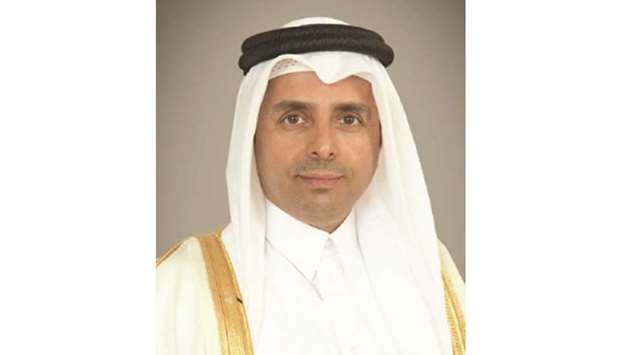HE the Minister of Education and Higher Education Dr Mohamed Abdul Wahed Ali al-Hammadi affirms that the Qatar has made unremitting efforts in facing the challenge of the coronavirus pandemic (Covid 19) and reducing the negative effects of its spread in various fields, most important of which is education.
The minister said that with the emergence of the pandemic and the suspension of study a result, and in accordance with the directives of His Highness the Amir Sheikh Tamim bin Hamad al-Thani, to continue the educational process in its planned path, the Ministry of Education and Higher Education took the decision to implement “distance learning” system, while taking several precautionary measures to ensure the health and safety of students.
This came in a speech delivered by the minister at the extraordinary (remote) meeting of the General Conference of Ministers of Education in the Member States of the Arab Bureau of Education for the Gulf States, which was held in the presence of Dr Nayef bin Falah al-Hajraf, Secretary-General of the Gulf Co-operation Council (GCC), Dr Madiha bint Ahmed al-Shaibania, Minister of Education in Oman, president of the General Conference, and Dr Ali bin Abdul-Khaliq al-Qarni, Director of the Arab Bureau of Education for the Gulf States.
The minister said that the education sector is one of the sectors most affected by the precautionary measures taken by governments in the face of the outbreak of the corona pandemic (Covid 19), which required rapid action from the ministries of education to find educational alternatives and methods to maintain the continuity of students’ education and provide educational opportunities for them.
In this regard, the minister added that the solution represented in adopting work with technological systems and their modern applications in the field of education, among which distance learning contributed to students’ communication with their schools and teachers to complete their education, while maintaining health and safety of all parties of the educational process.
“What made the transition to distance learning in the schools of the State of Qatar smooth and easy in these exceptional circumstances” is the state’s possession of all the pillars of the application of infrastructures represented in electronic platforms, digital sources, trained human cadres, and students who have skills in dealing with technology, pointing out that the focus on developing e-learning and promoting the digital transformation of the educational environment has been an integral part of the Ministry of Education and Higher Education’s strategic plan since the beginning of the education reform movement in Qatar, based on an insightful vision of the wise leadership.
On measures taken by the ministry to switch to distance learning, HE al-Hammadi, said that an integrated plan was put in place to implement the distance learning system for all levels of education that included all components of the educational process, and implementation started by providing the ministry with unified platforms on the the Internet, as well as two TV channels and 19 YouTube channels, to broadcast the video lessons throughout the day.
He added that educational lessons were produced and photographed for general education students with disabilities, in addition to specialised school students, preparing textbooks in the form of electronic files and uploading them to the platform, and broadcasting a number of awareness and training programmes via TV channels and social media directed to parties of the educational process and parents with the aim of directing towards distance learning and training them in the skills of dealing with available technological applications.
An appropriate period of time for the application of distance learning was also specified to cover the basic criteria in the school curricula according to modified study plans, ensuring that the students move to higher levels without knowledge gaps in their learning.
To ensure a successful learning experience in these circumstances, the ministry has provided tablets and Internet lines for students who do not have them, whether in government or private schools, as well as facilities for students who have been diagnosed with virus or their relatives.
The minister noted that a modified evaluation policy has been developed for students commensurate with the nature of distance learning, which included the application of a continuous evaluation system through distance learning for grades 1 through 11.
On the ministry’s plans for the future, HE al-Hammadi said that more than one vision has been put in place for what education will be in the coming year for all academic levels, and this was represented in the development of integrated plans for each concept, whether remote education will be implemented in full or in part or will be supportive of education in schools.
The minister highly appreciated the approval of the General Assembly of the United Nations of the proposal of Her Highness Sheikha Moza bint Nasser, Chairperson of the Board of Directors of the Education Above All Foundation, member of the group of defenders of the sustainable development goals of the United Nations, establishing September 9 as International Day to Protect Education from Attack.
“This is the decision led by the State of Qatar to mobilise international support in order to ensure accountability for the persistent and deliberate attacks on education and armed violence suffered by children throughout the world; Armed violence has caused enormous damage to the communications infrastructure of countries that are experiencing these conflicts, which has had a very negative impact on student achievement through distance learning systems”, he added.
The meeting discussed a number of educational topics, including efforts of the ministries of education in the member states of the Arab Bureau of Education for the Gulf States in facing the corona pandemic.

HE the Minister of Education and Higher Education Mohamed Abdul Wahed Ali al-Hammadi


